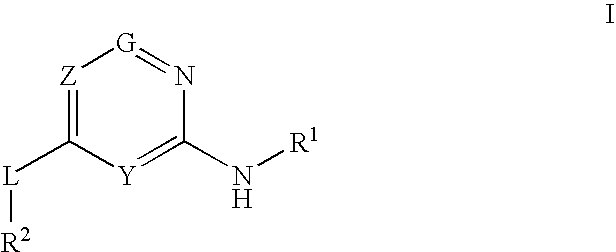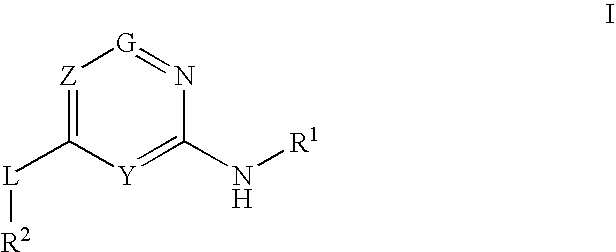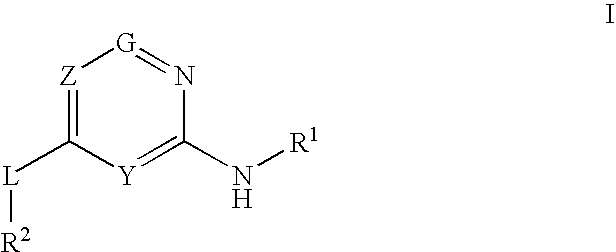Glucokinase activators
a technology of glucokinase and activator, which is applied in the direction of biocide, drug composition, metabolic disorder, etc., can solve the problems of insufficient insulin secretion of the pancreas, insufficient amounts of insulin to overcome intrinsic insulin resistance, and changes in carbohydrate, lipid and protein metabolism
- Summary
- Abstract
- Description
- Claims
- Application Information
AI Technical Summary
Benefits of technology
Problems solved by technology
Method used
Image
Examples
example 1
2-(2-(4-Methylthiazol-2-ylamino)pyridin-4-yloxy)benzonitrile
[0327]
[0328]Step A: Preparation of 4-(benzyloxy-2-chloropyridine: A 250 mL round-bottomed flask was charged with 4-(benzyloxy)pyridin-2(1H)-one (10.0 g, 49.7 mmol) and phosphorus oxychloride (55.6 mL, 596 mmol). The reaction mixture was heated at 90° C. overnight, then cooled and carefully quenched with sodium carbonate and sodium hydroxide to pH 7. The aqueous layer was extracted with dichloromethane. The organic layer was dried over sodium sulfate, filtered and concentrated. The residue was purified by silica gel column chromatography with dichloromethane as eluent to afford 4-(benzyloxy)-2-chloropyridine (5.14 g, 47.1% yield) as white solid. 1H NMR (CDCl3) δ 8.19 (d, 1H), 7.34-7.44 (m, 5H), 6.91 (d, 1H), 6.81 (dd, 1H), 5.10 (s, 2H). LC / MS: (5 to 95) Rt=2.64 min (ESI) m / z=220 (M+H) (40%).
[0329]Step B: Preparation of 4-(benzyloxy)-AN-(4-methylthiazol-2-yl)pyridin-2-amine: A 250 mL round-bottomed flask was charged with 2-am...
example 2
4-(2-(4-Methylthiazol-2-ylamino)pyridin-4-yloxy)benzonitrile
[0332]
[0333]Following the method of Example 1, Step D, 2-(4-methylthiazol-2-ylamino)pyridin-4-ol (0.100 g, 0.483 mmol), 4-fluorobenzonitrile (0.064 g, 0.531 mmol) and potassium carbonate (0.167 g, 1.21 mmol) were reacted to provide 4-(2-(4-methylthiazol-2-ylamino)pyridin-4-yloxy)benzonitrile (0.033 g; 20.0% yield) as white solid. 1H NMR (CDCl3) δ 8.27 (d, 1H), 7.72 (m, 1H), 7.70 (m, 1H), 7.18 (m, 1H), 7.16 (m, 1H), 6.52 (dd, 1H), 6.49 (m, 1H), 6.38 (s, 1H), 2.28 (d, 3H). HPLC (5 to 95) Rt=2.69 min; Mass spectrum (esi) m / z=309 (M+H).
example 3
Methyl 3-(2-(4-methylthiazol-2-ylamino)pyridin-4-yloxy)benzoate
[0334]
[0335]Step A: Preparation of methyl 3-(2-chloropyridin-4-yloxy)benzoate: Methyl 3-hydroxybenzoate (2.88 g, 18.9 mmol) was added to a mixture of 60% sodium hydride in mineral oil (0.757 g, 18.9 mmol) in DMF (20 mL). The reaction mixture was stirred for 20 minutes and then cooled in an ice bath. 2-Chloro-4-nitropyridine (3.00 g, 18.9 mmol) was added and the reaction mixture was stirred for 1 hour at 0° C., and then overnight at room temperature. The reaction mixture was partitioned between water and ethyl acetate. The organic layer was washed twice with water and brine, dried, and concentrated. The residue was purified by MPLC (Biotage) eluting with 5:1 hexane:ethyl acetate to afford methyl 3-(2-chloropyridin-4-yloxy)benzoate (4.49 g, 90.0% yield) as a thick oil. 1H NMR (CDCl3) δ 8.26 (d, 1H), 7.98 (d, 1H), 7.77 (s, 1H), 7.54 (t, 1H), 7-31 (d, 1H), 6.82 (s, 1H), 6.79 (d, 1H).
[0336]Step B: Preparation of methyl 3-(2-(...
PUM
| Property | Measurement | Unit |
|---|---|---|
| concentration | aaaaa | aaaaa |
| pH | aaaaa | aaaaa |
| temperature | aaaaa | aaaaa |
Abstract
Description
Claims
Application Information
 Login to View More
Login to View More - R&D
- Intellectual Property
- Life Sciences
- Materials
- Tech Scout
- Unparalleled Data Quality
- Higher Quality Content
- 60% Fewer Hallucinations
Browse by: Latest US Patents, China's latest patents, Technical Efficacy Thesaurus, Application Domain, Technology Topic, Popular Technical Reports.
© 2025 PatSnap. All rights reserved.Legal|Privacy policy|Modern Slavery Act Transparency Statement|Sitemap|About US| Contact US: help@patsnap.com



